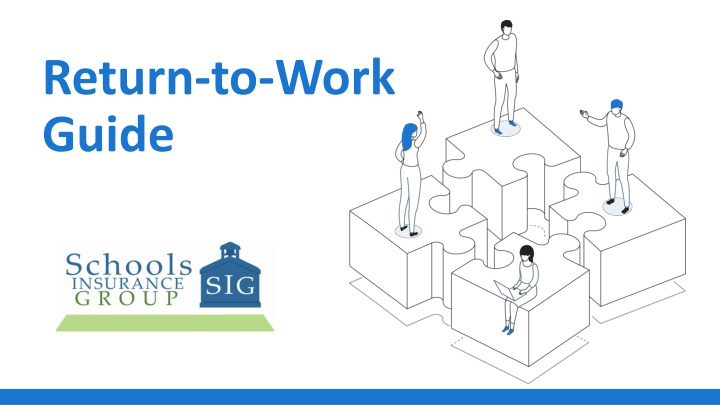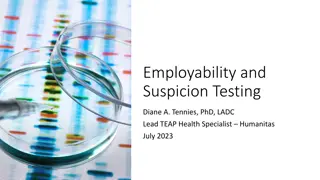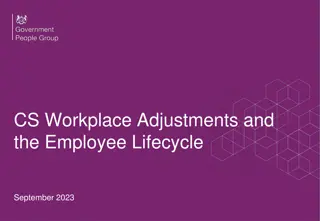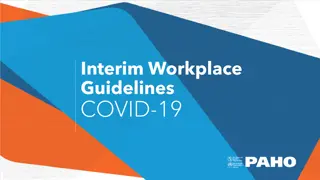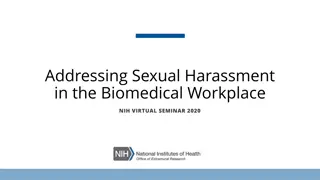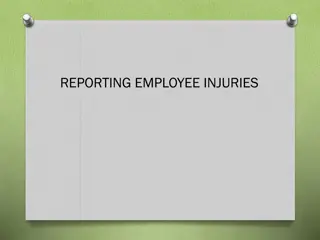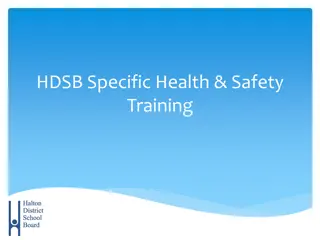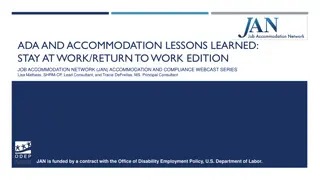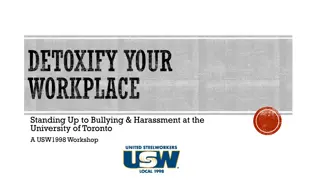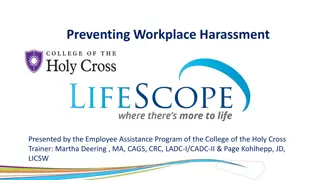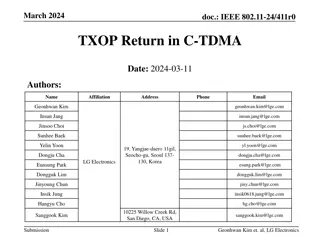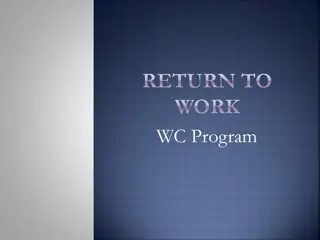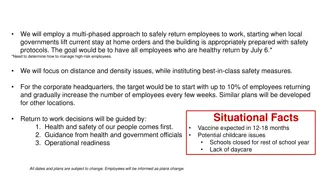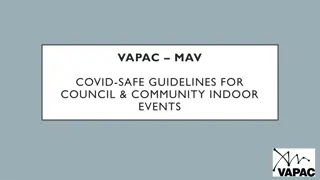Comprehensive Return-to-Work Guidelines for a Safe Workplace
As we transition back to work amidst the new normal, our priority is the safety and well-being of employees. The guidelines include self-evaluation for COVID-19 symptoms, cleaning protocols, distancing measures, and personal responsibilities to maintain a healthy workspace. By following these guidelines, we aim to create a secure environment and ensure a smooth return to work.
Download Presentation

Please find below an Image/Link to download the presentation.
The content on the website is provided AS IS for your information and personal use only. It may not be sold, licensed, or shared on other websites without obtaining consent from the author.If you encounter any issues during the download, it is possible that the publisher has removed the file from their server.
You are allowed to download the files provided on this website for personal or commercial use, subject to the condition that they are used lawfully. All files are the property of their respective owners.
The content on the website is provided AS IS for your information and personal use only. It may not be sold, licensed, or shared on other websites without obtaining consent from the author.
E N D
Presentation Transcript
Return-to-Work Guide
Welcome back! As we return to work and begin this new normal in our workplace, we understand that you may be concerned about safety as well as the changes to company policies and procedures that we have implemented. We want every employee to be assured that we are taking your concerns and the well-being of our employees and building tenants seriously. Edited May 28, 2020
What we are doing: SIG Office Environment All employees will self evaluate for COVID-19 symptoms. Entering the SIG office will indicate that you are attesting that you do not have a body temperature elevated above 100 degrees. Employees who have this symptom or other symptoms that could be related to COVID-19 should avoid coming into the SIG office and should work from home. Employees may return to work following CDC guidance. Remote work arrangements are in use to allow for staggered in-person work shifts to reduce the number of people in the SIG office at one time. All visitors entering the SIG office will complete a COVID-19 symptom checklist to be kept on file for 30 days in a secure location in the SIG office to protect any PHI. Any visitor exhibiting symptoms will be asked to avoid entering the SIG office to prevent any possible exposure to SIG employees.
What we are doing: Cleaning and Space Adjustments Common areas and frequently touched surfaces are being cleaned daily. Cleaning supplies will be available, and employees are encouraged to clean and disinfect workspaces throughout the workday. Hand sanitizer is provided throughout the building. Posters are displayed with reminders on how to prevent the spread of germs. Workspace layouts and seating arrangements are revised to allow for social distancing. Meeting rooms, break rooms and other communal areas have reduced seating and capacity limits. Business travel remains restricted to essential travel only. Additional measures under consideration: Touchless soap dispensers in all restrooms Disinfectant wipes for each SIG internal office space Upgraded HVAC filtration Touchless water dispensing Other measures in alignment with CDC, California, or Placer County guidelines
What you can do: Personal Responsibility Stay home or go home if you are sick. Maintain social distancing practices in our workplace. Follow cleaning product instructions when cleaning your work areas. Wash your hands frequently or use hand sanitizer in the absence of hand washing Cover your nose and mouth when sneezing or coughing. Avoid touching your face. Wear a face covering if you desire, especially in common areas of the building. Replace handshakes with head nods and waves. Avoid using other employees phones, desks, offices or other work tools and equipment, when possible. Commonly used items can be found in common areas, and will be cleaned daily. Talk to your supervisor if you have concerns specific to your circumstances, such as a health condition that places you or someone in your household at high risk. Follow all company policies and practices. Be kind. To every person. Understand that this is a stressful time for everyone, and an extra bit of kindness right now can go a long way.
Frequently Asked Questions Can I continue to work from home? Remote work arrangements will be considered, taking into account necessity to be in-person in the office according to tasks and job responsibilities. Specific needs for remote work arrangements will be prioritized, such as an employee with a compromised immune system or caregiving responsibilities that prevent the employee from returning to the workplace temporarily. Please discuss your specific circumstances with your supervisor. Is it safe to return to work? SIG is taking every precaution to ensure our workplace is safe. We are following federal, state, and local health and safety guidelines and implementing practices to minimize exposure to COVID-19, such as employee self-checks for elevated temperature and other symptoms that may be indicative of COVID-19. These practices include the use of masks as appropriate and social distancing practices to keep our workplace healthy.
Frequently Asked Questions, cont. What if I can t get to work? It is likely that some employees will have to change their normal commuting practice. Using mass transit may not be an option or may be considered too risky for some. You should take steps now to identify all potential options for a safe commute, such as using a personal vehicle or ride-share services. If you have difficulty with transportation to work, please discuss this with your supervisor. How will staggered work shifts impact me? We are staggering time in the office to reduce the number of people physically present at any one time. For example, instead of everyone working 8:30 a.m. to 4:30 p.m. and entering the building, stairs/elevator, coffee areas, etc. at the same time, remote work arrangements will be discussed to facilitate completion of job responsibilities and need/desire to be in the office. Your supervisor will meet with you to discuss a schedule that works for you.
Frequently Asked Questions, cont. Do I have to answer medical questions when reporting to work? All visitors will be required to answer questions regarding COVID-19 symptoms before entering our buildings. Employees are required to self-evaluate for COVID-19 symptoms prior to leaving their home, and to come to the office only if symptom free. Individuals who refuse to answer health screening questions will not be permitted entry into the SIG office. An employee s remote work arrangement will provide more detail regarding time in the office. Please see your employee handbook/policies regarding use of paid and unpaid leave for absences. What should I do if I feel sick? Employees who feel ill should notify their supervisor per the company policy and not report to work. If you are already at work and begin feeling sick, you should notify your supervisor and go home immediately. Employees can utilize accrued sick time and/or other paid leave that may be available. Please see your employee handbook/policies regarding use of paid leave for absences.
Frequently Asked Questions, cont. Do I have to wear a mask at work? Unless required by a state or local order, employees do not have to wear a mask at work. However, we do encourage face coverings in common areas of the building, and employees may choose to wear a mask within the SIG office environment if they desire. Employees in positions with frequent person-to-person contact may be required to wear masks. If masks are mandated by law and you have a medical condition that restricts you from wearing one, please speak with your supervisor. Will we continue to have in-person meetings? In order to promote social distancing in the workplace, some meetings will need to be restructured as teleconference or virtual meetings. You may be asked to attend an in-person meeting with limited attendees in a space that is large enough to allow for distancing between participants. In addition, some meetings will include a virtual option for employees to participate from their personal workspace or from a remote location. The meeting organizer and your supervisor can provide you with guidance specific to your role.
Frequently Asked Questions, cont. How will positive cases of COVID-19 be handled in the workplace? Despite all precautionary measures, there is always a risk of workplace exposure to communicable diseases. Should an employee contract COVID-19 and expose others in our workplace, we will immediately inform all employees of the possible exposure. Employees who have been potentially exposed will be sent home and asked to utilize a remote work arrangement for 14 days. A thorough cleaning of the workspace used by the infected individual will be conducted after the area has been closed off for at least 24 hours. Do I have to pay the health insurance premiums that I missed while I was not working? SIG does not expect to place any staff on unpaid leave or furlough at this time or in the forseeable future. (May 2020) However, if placed on unpaid leave or furlough, employees are responsible for paying their portion of health insurance premiums that were missed while on unpaid leave or furlough. Employees have several options for paying these premiums including a lump-sum payroll deduction or a series of deductions spread over time. You will be contacted by your supervisor to make arrangements for these payments.
We will remain flexible to adapt to the evolving situation SIG s reaction to changes in our work environment due to COVID-19 prevention and/or mitigation plans may impact where you work, and how you interact with SIG members. It is vital that our members be prioritized, and that we are able to continue to provide resources, advice, and support as needed or requested. Please remain flexible in your approach to work, and ready to adapt as we continue to learn about and address impact from this pandemic crisis. Your personal safety is very important. SIG is acting to provide a safe work environment. It is also expected that you will follow safe practices in your personal environment to prevent the spread of this and other communicable diseases. Cindy Wilkerson Executive Director Schools Insurance Group Edited May 28, 2020
